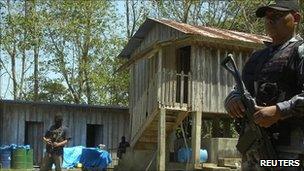First Honduras cocaine laboratory discovered
- Published

Honduran Security Minister Oscar Alvarez said the cocaine lab was "first rate"
Honduran police have for the first time uncovered a cocaine lab in the country.
Officers found an installation full of barrels of chemicals and tools used to process the drug in a mountainous area north of the capital, Tegucigalpa.
Security Minister Oscar Alvarez said the "first rate" facility was probably being run by Mexican gangs.
The discovery could indicate that Mexican cartels, who are increasingly moving into Central America, are also making cocaine themselves.
It would also signal a shift northwards for cocaine production, traditionally dominated by Colombia.
The drugs laboratory was found on a coffee plantation in a remote area of Honduras known as Cerro Negro, about 175km (100 miles) north of the capital.
'Resounding blow'
It is thought that it may have been run by a drugs cartel from Mexico, operating in Honduras to produce cocaine to be smuggled into the US.
Local people said they had seen helicopters land and heard people talking with a Mexican accent.
Mr Alvarez likened the facilities to the best in Colombia and called the operation a "resounding blow" to drug-trafficking in the country.
No arrests were made in the raid and no drugs were found, he added.
Although Colombia, Peru and Bolivia remain the world's biggest producers of cocaine, Central America is an important corridor for trafficking drugs north into the United States market.
A recent US state department report, external said that "the geographical location, limited resources, and weak law enforcement in... areas of the Atlantic coast make Honduras vulnerable to drug trafficking organizations (DTO) operating from South America and Mexico".
Mexican drug cartels, which control much of the estimated $13.6bn drug-trafficking trade into the US, are increasingly operating in Central America.
This has fuelled fears that the region could suffer a similar wave of gang violence that has left more than 34,000 people dead since 2006 in Mexico.
- Published20 December 2010
- Published9 September 2010